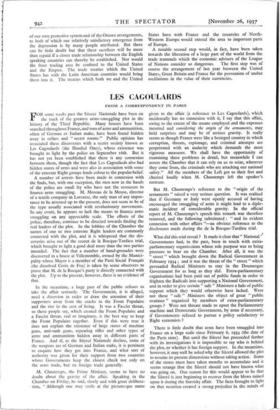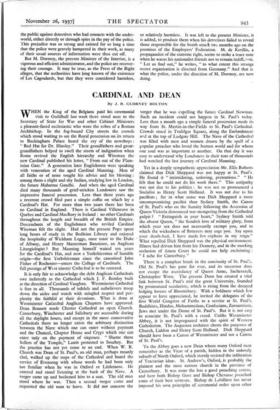LES CAGOULARDS
FROM A CORRESPONDENT IN PARIS
FOR some weeks past the Siirete Nationale have been on the track of the greatest arms-smuggling plot in the history of the Third Republic. Many houses have been searched throughout France, and tons of arms and ammunition, often of German or Italian make, have been found hidden away in cellars and " secret rooms." Public opinion has associated these discoveries with a secret society known as Les Cagoulards (the Hooded Ones), whose existence was brought to light by the police on September 16th. But it has not yet been established that there is any connexion between them, though the fact that Les Cagoulards also had hidden stores of arms and were also in association with some of the extreme Right groups lends colour to the popular belief.
A number of arrests have been made in connexion with the finds, but, with one exception, the men now in the hands of the police are small fry who have not the resources to finance arms smuggling. M. Moreau de la Meuse, director of a textile company in Lorraine, the only man of any impor- tance to be arrested up to the present, does not seem to be of the type usually associated with revolutionary movements. In any event, he appears to lack the means to finance arms smuggling on any appreciable scale. The efforts of the police, therefore, continue to be directed towards finding the real leaders of the plot. In the lobbies of the Chamber the names of one or two extreme Right leaders are commonly connected with the plot, and it is whispered that the dis- coveries arise out of the recent de la Rocque-Tardieu trial, which brought to light a good deal more than the two parties intended. The fact that a number of hand-grenades were discovered in a house at Villemomble, owned by the Munici- pality whose Mayor is a member of the Parti Social Francais (the dissolved Croix de Feu) is taken by some observers to prove that M. de la Rocque's party is directly connected with the plot. Up to the present, however, there is no evidence of that.
In the meantime, a large part of the public refuses to take the affair seriously. The Government, it is alleged, need a diversion in order to draw the attention of their supporters away from the cracks in the Front Populaire and the rise in the cost of living. It was a Fascist threat, so these people say, which created the Front Populaire and a Fascist threat, real or imaginary, is the best way to keep the Front Populaire together. Even if this were true it does not explain the existence of large stores of machine guns, anti-tank guns, repeating rifles and other types of arms and ammunition hidden away in different parts of France. And if, as the Siirete Nationale declare, some of the weapons are of German and Italian make, it is pertinent to enquire how they got into France, and what sort of authority was given for their support from two countries whose Governments keep the closest check not only on the arms trade, but on foreign trade generally.
M. Chautemps, the Prime Minister, seems to have no doubt about the gravity of the affair. Speaking -in the Chamber on Friday, he said, slowly and with great delibera- - tion, " Although one may -smile at the picturesque name given to the affair (a reference to Les Cagoulards), which incidentally has no connexion with it, I say that this affair, ()Wing to the extent of the means employed and the expenses incurred and considering the origin of the armaments, may hold surprises and may be of serious gravity. It really seems as though France were like a besieged country in which corruption, threats, espionage, and criminal attempts are perpetrated with an audacity which demands the most vigorous measures. We shall have the opportunity of examining these problems in detail, but meanwhile I can assure the Chamber that it can rely on us to seize, wherever they come from, the criminals who are attacking our national safety." All the members of the Left got to their feet and cheered loudly when M. Chautemps left the speaker's rostrum.
But M. Chautemps's reference to the "origin of the armaments " raised a very serious question. It was realised that if Germany or Italy were openly accused of having encouraged the smuggling of arms it might lead to a diplo- matic incident of considerable gravity. In the official report of M. Chautemps's speech this remark was therefore removed, and the following substituted : " and its evident connexion with other affairs "—an obvious reference to the disclosures made during the de la Rocque-Tardieu trial.
What did this trial reveal ? It made it clear that " National Governments had, in the past, been in touch with extra- parliamentary organisations whose sole purpose was to bring pressure to bear on the Chamber. After all, it was the " street " which brought down the Radical Government in February 1934 ; and it was the threat of the " street " which persuaded Radical Ministers to stay in the Doumergue Government for as long as they did. Extra-parliamentary organisations had been paid out of public funds in order to frighten the Radicals into supporting a National Government, and in order to give certain " safe " Ministers a halo of public support which they would otherwise have lacked. Were not these " safe " Ministers the object of great " public ovations " organised by members of extra-parliamentary groups ? Were not threats made to upset the Parliamentary machine and Democratic Government, by arms if necessary, if Governments refused to pursue a policy satisfactory to Right extremists ?
There is little doubt that arms have been smuggled into France on a large scale since February 6, 1934 (the date of the Paris riots). But until the Sarete has proceeded farther with its investigations it is impossible to say who is behind the plot, or whether it has foreign support. In the meantime, however, it may well be asked why the Surete allowed the plot to assume its present dimensions without taking action. Some of the stores must have taken months to accumulate and it seems strange that the Siirete should not have known what was going on. One reason for this would appear to be that the &Vete is just beginning to recover from the blows rained upon it during the Stavisky affair. The facts brought to light on that occasion created a strong prejudice in the minds of the public against detectives who had contacts with the under- world, either directly or through spies in the pay of the police. This prejudice was so strong and existed for so long a time that the police were gravely hampered in their work, as many of their usual sources of information were thus cut off.
But M. Dormoy, the present Minister of the Interior, is a vigorous and efficient administrator, and the police are recover- ing their courage. It may be true, as the Press of the Right alleges, that the authorities have long known of the existence of Les Cagoulards, but that they were considered harmless, or relatively harmless. It was left to the present Minister, it is added, to produce them when his detectives failed to reveal those responsible for the bomb attack twc. months ago on the premises of the Employers' Federation. M. de Kerillis, a propagandist of the extreme right, seems to strike a truer note when he warns his nationalist friends not to remain indiffiztnt. " Let us find out," he writes, " to what extent this strange secret organisation is directed from Germany." And that is what the police, under the direction of M. Dormoy, are now doing.















































 Previous page
Previous page